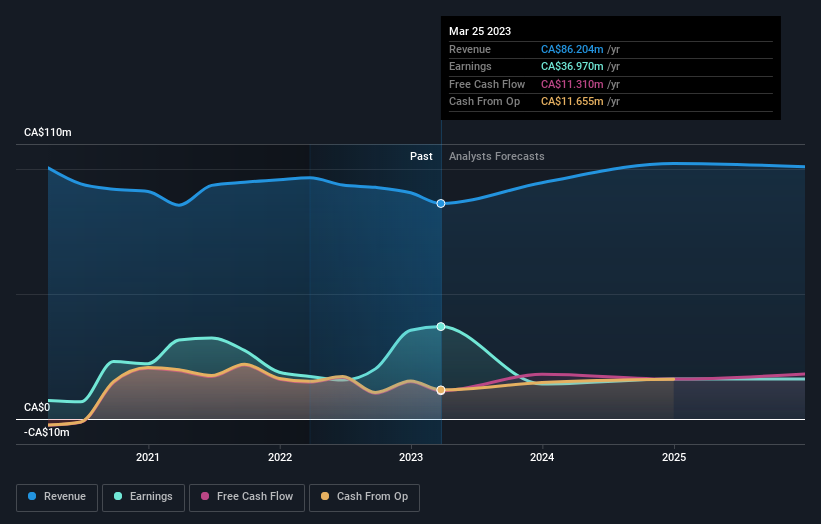Acadian Timber Corp.'s (TSE:ADN) top owners are private companies with 46% stake, while 42% is held by individual investors
Key Insights
Significant control over Acadian Timber by private companies implies that the general public has more power to influence management and governance-related decisions
53% of the business is held by the top 2 shareholders
A look at the shareholders of Acadian Timber Corp. (TSE:ADN) can tell us which group is most powerful. The group holding the most number of shares in the company, around 46% to be precise, is private companies. Put another way, the group faces the maximum upside potential (or downside risk).
Meanwhile, individual investors make up 42% of the company’s shareholders.
Let's take a closer look to see what the different types of shareholders can tell us about Acadian Timber.
Check out our latest analysis for Acadian Timber
What Does The Institutional Ownership Tell Us About Acadian Timber?
Many institutions measure their performance against an index that approximates the local market. So they usually pay more attention to companies that are included in major indices.
As you can see, institutional investors have a fair amount of stake in Acadian Timber. This implies the analysts working for those institutions have looked at the stock and they like it. But just like anyone else, they could be wrong. When multiple institutions own a stock, there's always a risk that they are in a 'crowded trade'. When such a trade goes wrong, multiple parties may compete to sell stock fast. This risk is higher in a company without a history of growth. You can see Acadian Timber's historic earnings and revenue below, but keep in mind there's always more to the story.
Hedge funds don't have many shares in Acadian Timber. Our data shows that Macer Forest Holdings Inc. is the largest shareholder with 46% of shares outstanding. With 7.4% and 1.7% of the shares outstanding respectively, Pictet Asset Management Limited and Dimensional Fund Advisors LP are the second and third largest shareholders.
After doing some more digging, we found that the top 2 shareholders collectively control more than half of the company's shares, implying that they have considerable power to influence the company's decisions.
Researching institutional ownership is a good way to gauge and filter a stock's expected performance. The same can be achieved by studying analyst sentiments. There are plenty of analysts covering the stock, so it might be worth seeing what they are forecasting, too.
Insider Ownership Of Acadian Timber
The definition of company insiders can be subjective and does vary between jurisdictions. Our data reflects individual insiders, capturing board members at the very least. The company management answer to the board and the latter should represent the interests of shareholders. Notably, sometimes top-level managers are on the board themselves.
Most consider insider ownership a positive because it can indicate the board is well aligned with other shareholders. However, on some occasions too much power is concentrated within this group.
Our information suggests that Acadian Timber Corp. insiders own under 1% of the company. But they may have an indirect interest through a corporate structure that we haven't picked up on. It appears that the board holds about CA$1.8m worth of stock. This compares to a market capitalization of CA$276m. Many tend to prefer to see a board with bigger shareholdings. A good next step might be to take a look at this free summary of insider buying and selling.
General Public Ownership
The general public-- including retail investors -- own 42% stake in the company, and hence can't easily be ignored. This size of ownership, while considerable, may not be enough to change company policy if the decision is not in sync with other large shareholders.
Private Company Ownership
Our data indicates that Private Companies hold 46%, of the company's shares. It might be worth looking deeper into this. If related parties, such as insiders, have an interest in one of these private companies, that should be disclosed in the annual report. Private companies may also have a strategic interest in the company.
Next Steps:
It's always worth thinking about the different groups who own shares in a company. But to understand Acadian Timber better, we need to consider many other factors. Be aware that Acadian Timber is showing 3 warning signs in our investment analysis , and 1 of those is potentially serious...
If you are like me, you may want to think about whether this company will grow or shrink. Luckily, you can check this free report showing analyst forecasts for its future.
NB: Figures in this article are calculated using data from the last twelve months, which refer to the 12-month period ending on the last date of the month the financial statement is dated. This may not be consistent with full year annual report figures.
Have feedback on this article? Concerned about the content? Get in touch with us directly. Alternatively, email editorial-team (at) simplywallst.com.
This article by Simply Wall St is general in nature. We provide commentary based on historical data and analyst forecasts only using an unbiased methodology and our articles are not intended to be financial advice. It does not constitute a recommendation to buy or sell any stock, and does not take account of your objectives, or your financial situation. We aim to bring you long-term focused analysis driven by fundamental data. Note that our analysis may not factor in the latest price-sensitive company announcements or qualitative material. Simply Wall St has no position in any stocks mentioned.
Join A Paid User Research Session
You’ll receive a US$30 Amazon Gift card for 1 hour of your time while helping us build better investing tools for the individual investors like yourself. Sign up here

 Yahoo Finance
Yahoo Finance 

